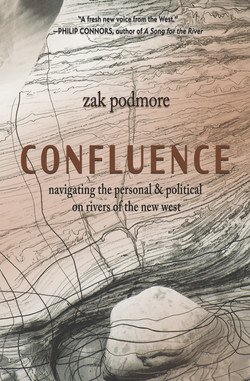Читать книгу Confluence - Zak Podmore - Страница 9
На сайте Литреса книга снята с продажи.
ОглавлениеIt’s early summer and the water is high. My mother grasps the handles of two wooden oars and feels the Colorado River surge through her arms. A gray ring of raft surrounds her, sixteen feet from bow to stern, and beyond it, the mud-red river roils. Near the bow, her friend and former college roommate sits on a cooler. They’re raft guides out for a week in Utah canyons with no clients, and they’re nearing the crux of the trip: a feature known to river runners, in both fondness and fear, as Satan’s Gut. Directly downstream the Gut heaves in a gnashing pit of foam large enough to swallow a Winnebago. River and air are locked in combat. The water billows up in angry clouds that never manage to sail into the sky but are pulled under again and again. Other boats in their party have already disappeared beyond the maelstrom.
As the current gathers speed, the world tilts. The first waves at the top of the rapid crash over the gray tubes and the raft fills like a bathtub. That morning the boat’s load of army-surplus ammo cans—packed with apples, peanut butter, and beer—were lashed to the metal frame under a net of faded webbing. Now they float beneath their restraints. The woman in the front of the raft stands knee-deep on the floor and bails with a five-gallon bucket twice before sitting back down and grabbing onto a strap.
Bracing her feet against a box, my mother pulls back on the Douglas fir oars so they bend against the water. Deep in the woodgrains, fibers creak and snap. But the raft’s course can’t be altered. The front tubes cross the upstream edge of the hole and the boat tips smoothly into its mashing heart. A white wall of water rolls across the bow and smacks my mother square in her lifejacket. The boat, more ballast than flotation, barely slows as the oars are ripped from her hands.
The raft continues downstream. My mother does not.
She circles in the hole three times like a paper bag blowing through a culvert. As if compelled, she folds her knees to her chest and lets a deeper current pull her far below the roar. Ears pop as knees graze the limestone cobbles imbricated along the river bottom. All at once, it is quiet, dark, calm—even peaceful. She tumbles and does not know which way is up. Her lifejacket doesn’t seem to, either.
She was twenty-five then, my sister and I still dreaming in the void of uncreation. When she’d tell the story to me later, she’d always gloss over her time underwater, but I could tell by her face that lifetimes were contained in the minute or two she spent beneath the Colorado River, that severed umbilical cord which once ran from the Rockies through the desert to the sea. I do not know what thoughts moved through her mind while she was submerged. I do not know what messages were pressed to her eardrums, what visions played through the pressure on her eyelids. But I’m aware that such moments are rarely silent; there is an abyss between the surface realm of the rower and the underworld of the swimmer. Over a life of river running, I’ve crossed that gap more than once. Time begins to stretch and bend below the surface. Unheard voices start to speak, even if their words cannot be repeated after breaking back through to the sanity of the day. As my mother sank all those years ago, I wonder what lights shone in the galaxies of her memories. Or was it all darkness—a wash of panic? It’s too late to ask her now.
She did tell me the story’s conclusion, though. Just as her searing lungs felt they could take no more, the river released its grip. The current slackened into a calm pool beyond the rapid, and the foam flotation around her chest began to propel her upward as if it were attached to the sky by a string. Her head broke through and dry air screamed into her lungs. Rescue ropes came slinging across the water from the half-circle of rafts around her.
There she was, located again, neck-deep in a river that carves through the bottom of the Colorado Plateau. The sun blazed on the broken stone blocks that spilled down from the canyon walls. The sediments in the river swirled like high country emissaries from the Never Summer Range, the Uintas, Abajos, La Sals, Wind Rivers, and San Juans. All around, dry washes tipped steeply toward the Colorado as if the arid landscape were bowing to the river, to the surging rapid, and to my mother, alive.
